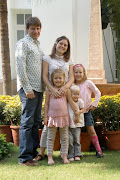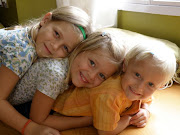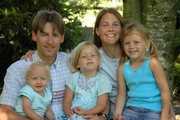During my time at Regent College I took a class on Prayer from Eugene Peterson. One of the assignments he gave us was to write a paper on “the soil of our prayer lives.” His intent was to have us reflect on the various aspects of our lives out of which we learned to express ourselves to God. It was a helpful exercise for me and I recently enjoyed reading the paper again. I’ve re-written it here now in three parts, entitled, “Early Prayers.” Below is Part Two.My father was a college professor at the time of my birth, but when I was five he left the college and took a job at a maximum-security prison as a guard. His motivation in this career change was to have an opportunity to love and serve those in prison. But he soon realized that his position as a guard was not conducive to his role as a helper and friend of prisoners. So, when the job of prison chaplain came open he eagerly applied. For the bulk of my childhood, then, my Dad worked as a prison chaplain, and the farm that we lived on became the hub of a community of Christians who were committed to prison ministry. Our home was a place of refuge for prisoners who were out on parole and ex-prisoners who were making the transition back into society. For more than a decade, we as a family shared our lives with the lives of these very special men.
This phase of my upbringing was to have a major impact on my life in many ways. One of the most significant things that I learned was something that I saw modeled by my parents: the art of taking risks with people. This also played a profound role in the development of my prayer life.
Both my parents, together with a group of their friends, were committed to giving the men who came to us a chance to live new lives. For the most part, these were men who had either grown up in broken homes or foster homes or some kind of institution. Most of them had also been involved in drug and/or alcohol abuse. All of them, of course, had been involved in crime, and crime serious enough to merit maximum-security detainment. In addition, most had also been the victims of sexual abuse, brutality, prejudice, hatred and mistrust.
Our home was nothing like anything these men had ever experienced. For the first time, these men became a part of a loving and caring family. We all slept under one roof: my parents, my siblings, and our special guests. We ate together, worked together, played together, and prayed together. Everything that was available to us was also available to them. There were rules, but no locked doors.
That this was a risk was plain. Many who looked on, including Christians, voiced their concerns and criticized. My parents heard some of it. They were not unaware of the risk involved. They knew the potential danger that these men could have been to their family, their possessions, and their reputation. Indeed, rules were broken, possessions went missing, angry words were spoken, some friends may have distanced themselves, but my parents continued to give and to trust and to pray. For them, their faith in God enabled them to take the risks, and their prayer life empowered them to face the consequences.
For me, this example, lived before me, left an indelible imprint on my mind and quickly became the foundation for my own walk of faith and life of prayer.
One experience, in particular, brought a prayer to my lips that I will never forget. I was eleven years. My parents were away for the weekend (a rarity) and I was at home with my brothers and sisters and Ron. Ron had already been living with us for a month since his release from prison. He was one of the most gentle and considerate men that we had had live with us. In general, he was adjusting well to life on the outside. But with my parents away and one month of freedom behind him Ron decided that it was time to celebrate. After a drinking bout in town on Friday night he returned to our house in a drunken stupor. I remember getting the call from the taxi driver telling us that the man he had just dropped off at our house had passed out on the front lawn. With a supply of “uppers” on hand, Ron was high all Saturday and on to Sunday. It was a difficult weekend for us kids. We did have help from others, but we took the brunt of the mess upon ourselves.
Among my most vivid memories of that weekend was from Saturday morning when Ron came up from the basement to the main floor of our house. I had never thought of Ron as dangerous until then. I didn’t know the details of his past. I didn’t know what he was capable of. But now I was anxious and afraid.
Being the second youngest, I stayed upstairs and let my elder siblings deal with Ron directly. But even from my bedroom I could hear his bellowing voice. I was trembling. Then I remember getting down on my knees, alone in my room, and with Ron’s stammering speech in the background, I prayed one of the most genuine and desperate prayers I’d ever prayed, “O God, help us.”
God answered that prayer. We survived that weekend. And what I gained from that experience far outweighed any negative effect that it might have had on me.
There are always risks involved in trusting people, because people are unpredictable. But what I learned from my parents was why we trust people. My parents trusted people not because they believed that people were intrinsically good and therefore it would be the logical and smart thing to do. Rather, they trusted people because they believed that trust communicated love. And they saw love as their chief responsibility before God, whatever the response would be of those who were the objects of that love.
So, it was in the midst of painful uncertainty that I also saw love and trust, and my own heart responded to it all in a desperate prayer to God. In my vulnerable state, I called out to him. I needed him. I needed something from him.
My parents taught me that the state of desperation is good and right. It should not be feared or avoided. We need to embrace the uncertainty in our lives and allow it to feed our understanding of what is certain.
Taking risks with risky people is a lot like traveling; both ventures push us into unfamiliar and uncertain ground. And that is precisely where I learned the prayer of desperation.































